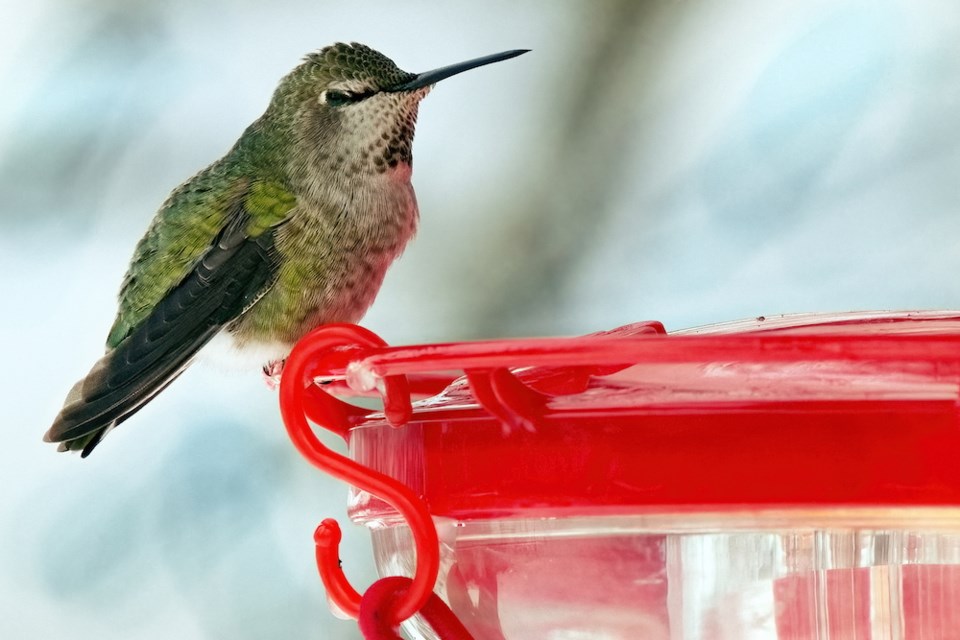B.C.-based Wildlife Rescue Association (WRA) is offering Tri-Cities residents tips on how to deal with stressed or injured hummingbirds during the recent cold snap and snowfall.
With snowfall as deep as 20 cm or more in the region, some hummingbirds may be kept from their nests.
WRA spokesperson Jackie McQuillan said the organization has been fielding multiple calls in the last few days from people concerned about wildlife.
But hummingbirds are feeling the impacts more than most.
"We received a call earlier this week from a woman with a hummingbird nest in her yard that had been covered in snow," said McQuillan,
"The poor hummingbird couldn't get to her nest to keep it warm, so we instructed her [the caller] to carefully move the snow aside without disturbing the nest to give the mother access."
According to the association, hummingbirds nest earlier than most species of birds, and seeing nesting activity from local hummingbirds in late February isn’t uncommon.
"If a member of the public knows that a hummingbird nests nearby, they should take care when removing or shaking snow from affected trees," McQuillan further stated.
The WRA has also provided information on its website about best practices for helping hummingbirds and other wildlife during cold weather.
Common winter injuries include frostbitten and damaged tongues, defensive injuries from fighting rivals for access to limited food supplies, hypothermia (frozen to feeders or other structures, and dropped to the ground), and hypoglycemia (low blood sugar, from not consuming enough calories).
Fortunately, many of these injuries can be prevented through proper feeder care.
Wildlife Rescue offers the following tips:
- Keep your feeders free of ice-crystals
- Create a warming zone by sheltering your feeder from wind and snow
- Avoid feeders with exposed metal parts during sub-zero temperatures
- Do not remove the bird from the feeder if any body part is frozen to it
- Keep your feeder clean!
- Put up more feeders in multiple locations.; this allows for the birds to spread out and gives more opportunity for many birds to use them — out of sight from another feeder is best!
- Do not place more feeders up if you cannot maintain them properly. Putting up one feeder is a commitment but putting up many can be a part-time job! Make sure you have the resources to maintain the feeders properly.
@tricitynews We ❤️ hummingbirds! #tricitynews #coquitlam #vancouver #surrey #langley #hummingbird #hummingbirds #feed #feeders ♬ Hummingbird - Cocoon
Signs of distress or injury, and what to do
- Hummingbird Still or Frozen in Place — The bird could be in torpor or in distress (See below for more details on Torpor)
- Assess if a body part is stuck to the feeder.
- If stuck:
- Carefully drizzle tepid water on the specific area of the bird that is stuck/attached to the feeder
- Allow the bird to naturally pull itself away from the surface, as we do not want to use any force to remove
- If the tongue is awkwardly stuck and difficult to loosen with tepid water, move the bird and feeder to a warm indoor location to let the surface thaw as quickly as possible.
- If stuck:
- Bring any bird that has been frozen to a surface to WRA for care.
- Assess if a body part is stuck to the feeder.
- Passing Out — The bird lands on the feeder, then after eating, it passes out from the cold and falls in the snow.
- Assess the location:
- If it is on the ground, -bring the bird into WRA immediately.
- If it is perched on a high surface and the animal looks normal but sleepy, the bird may be in torpor. Monitor closely to assess if its disposition changes. During the daytime, hummingbirds feed frequently, so after a short period, you should see if flying and feeding. If the bird does not wake to feed please bring the bird to WRA immediately. If you need help assessing the bird’s behaviour please call or email our Helpline at 604-526-7275 or [email protected]
- Assess the location:
- Tongue sticking out — if it does not retract back into the mouth it may be a sign of severe injury.
- Their tongues are extremely sensitive to disease and frostbite
- This is a time-sensitive injury and the animal needs treatment and warmth right away.
- Bring the bird to WRA immediately.



